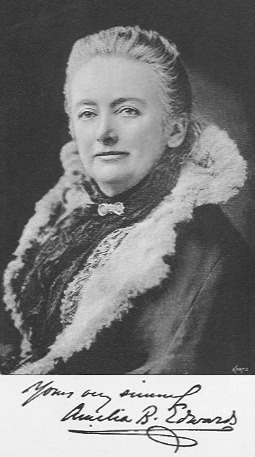
The Encyclopedia of Fantastic Victoriana
by Jess Nevins

"The Four-Fifteen Express" (1866)
copyright © Jess Nevins 2022
“The Four-Fifteen Express” was written by Amelia B. Edwards and first appeared in Routledge’s Christmas Annual, 1867 (1866). Edwards (1831-1892) was an author who became notable in her lifetime as an Egyptologist. During a trip to Egypt she became horrified at the destruction wrought to monuments by looters, and so founded the Egypt Exploration Fund, one of the first major archeological societies. “The Four-Fifteen Express” is one of Edwards’ most anthologized stories, but while often considered “classic” it is only a mediocre ghost story.
William Langford, a junior partner in a business firm, is home in England after months away on business and is happily looking forward to spending the Christmas holidays with his friend Jonathan Jelf in Clayborough in East Anglia. He takes the 4:15 express to Clayborough and sits in an unoccupied compartment. To his dismay another gentleman enters the compartment. Langford recognize the man: he is John Dwerrihouse, a rich lawyer and friend of Jonathan Jelf who Langford had met some years before at Jelf’s house. The two chat, and Dwerrihouse tells Langford at tedious length about a new railway line that he is involved in constructing, about all the difficulties involved in its construction, and about the amount of money Dwerrihouse is carrying, £75,000, which will be used for paying a deed of sale. Langford tells Dwerrihouse that he is visiting the Jelfs on holiday, and Dwerrihouse tells Langford about the fire in his room the last time he visited the Jelfs. Dwerrihouse exits the train at his stop, but Langford sees that he left his leather cigar case behind, and runs after Dwerrihouse to return it to him. Langford sees Dwerrihouse walking with another man, but he is momentarily interrupted while running after the pair, and when he looks up they are gone, and no one else saw them. Langford is nonplused by their disappearance, and later, at Jelf’s manor, he mentions to the company that Dwerrihouse sent them his best wishes. Ghastly silence ensues, and it emerges that Dwerrihouse absconded three months ago with £75,000 of his company’s money, and has not been heard of since. Langford’s story is doubted by others, but he has the cigar case, which is monogrammed and which everyone remembers Dwerrihouse carrying, and the person on the train told Langford details about his stay at the Jelfs which only Dwerrihouse would know. Then Dwerrihouse’s employers ask to speak with Langford. They doubt him, and one of their undersecretaries, the man who Langford saw speaking with Dwerrihouse, has an alibi for When Langford saw him with Dwerrihouse. But Langford puts the right questions to the right people, and it is eventually revealed that Dwerrihouse had the money but that the undersecretary assaulted Dwerrihouse, meaning only to rob him. Raikes, the undersecretary, struck Dwerrihouse too hard and killed him, and so not being able to go to America with the money, as he had planned–for he would be extradited from America for murder, which he wouldn’t have been for robbery–he returned to work and hid the money. It was Dwerrihouse’s ghost Langford saw on the train....
“The Four-Fifteen Express” is well-thought-of by modern critics, especially because of Edwards’ incorporation of the railway into a horror story, something not particularly common in the mid-1860s; Edwards’ use of “the ghost in the machine” was innovative.1 But in all likelihood most readers will find “The Four-Fifteen Express” underwhelming and not particularly impressive. The way in which Edwards works through the story’s set-up, delivery, and investigation is almost laborious. She indulges in some histrionics: “‘Merciful heaven!’ he whispered. ‘What was it, then, that you saw on the train?’”2 This type of overstatement generally mitigates against enjoyment of a horror story; readers are more frightened by what is not seen than when the characters shriek about what they have seen.
Recommended Edition
Print: Amelia B. Edwards, The Phantom Coach: Collected Ghost Stories. Ashcroft, BC: Ash-Tree Press, 2012.
Online: https://catalog.hathitrust.org/Record/102110691
1 Diana Basham, “Life After Spiritualism: Victorian Women’s Ghost Stories,” in Diana Basham, ed., The Trial of Woman: Feminism and the Occult Sciences in Victorian Literature and Society (New York: Palgrave Macmillan, 1992), 161.
2 Amelia B. Edwards, “The Four-Fifteen Express,” in Frederick B. De Berard, ed., Famous Occult Tales (New York: Isaac H. Blanchard, 1899), 243.